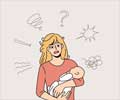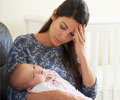
Depression Associated With Hormonal Contraceptive Use as a Risk Indicator for Postpartum Depression
Go to source). According to the researchers behind the new study, this may be because some women are more susceptible to both the hormonal changes caused by hormonal birth control as well as in relation to pregnancy and delivery.
‘Hormonal birth control helps provide clues whether mothers are at an increased risk of developing postpartum depression. ’
Tweet it Now
This knowledge may be able to help midwives and doctors identify women at risk of developing postpartum depression. “When women start hormonal birth control, their body and brain are exposed to synthetic sex hormones and the body’s own production of sex hormones is suppressed. Some women appear to be more susceptible to these changes than others – in some, it may lead to a depressive episode. Women undergo great hormonal changes in relation to pregnancy and delivery, and it is believed that these changes can contribute to the development of some postpartum depressive episodes,” says Søren Vinther Larsen.
Exploring the Effects of Hormonal Birth Control on Mental Health
The fact that postpartum depression is associated with a history of depression is not news to the researchers.“We wanted to determine whether some women of child-bearing age are more susceptible to hormonal changes than others. And the results of the study suggest that this is indeed the case,” says Søren Vinther Larsen.
The study is a so-called register study including health data on almost 200,000 primiparous women. The researchers were only able to identify the most severe cases, i.e., when the doctor prescribed medical drug treatment or the woman were diagnosed with depression at the hospital.
Therefore, the results do not necessarily apply to milder cases, Søren Vinther Larsen explains.
Advertisement
Reference:
- Depression Associated With Hormonal Contraceptive Use as a Risk Indicator for Postpartum Depression - (https://jamanetwork.com/journals/jamapsychiatry/fullarticle/2804354)










